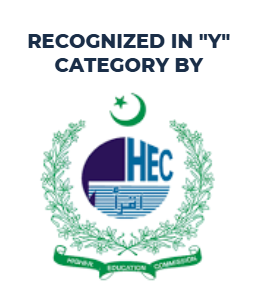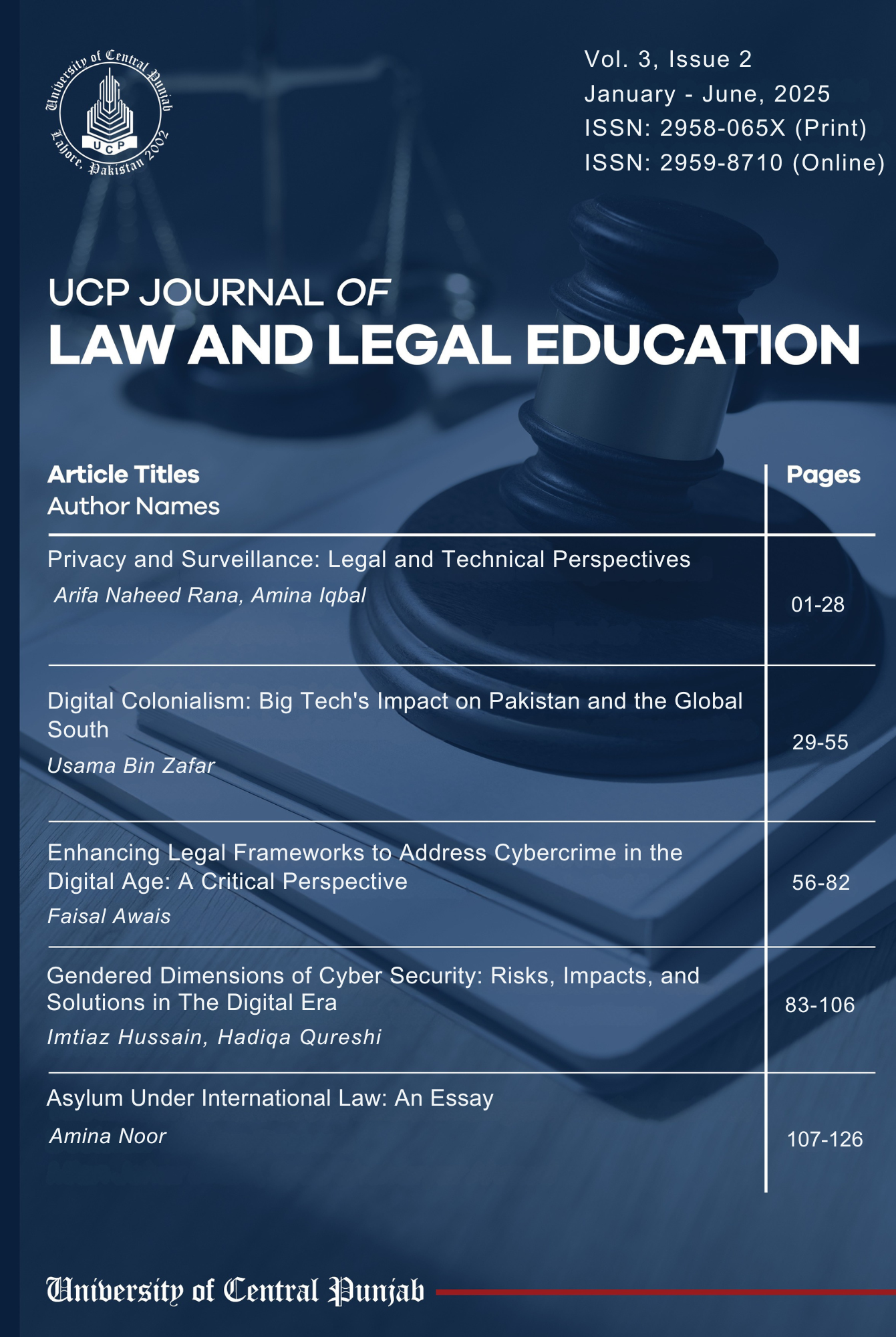
Vol. 3 No. 2 (2025): UCP Journal of Law and Legal Education

This issue brings together five insightful papers that address the evolving intersections of law, technology, and human rights, reflecting diverse perspectives on privacy, digital governance, cybersecurity, gender, and humanitarian protection. Collectively, they illuminate the challenges of adapting legal frameworks to the fast-changing realities of the digital and global order.
The opening paper, “Privacy and Surveillance: Legal and Technical Perspectives” by Arifa Naheed Rana and Amina Iqbal, explores the constitutional and statutory safeguards of privacy in Pakistan against the backdrop of increasing state surveillance. Anchored in doctrinal and comparative legal analysis, the study evaluates key laws, including the Investigation for Fair Trial Act 2013 and the Prevention of Electronic Crimes Act 2016, through the principles of legality, proportionality, necessity, and oversight. The authors find that Pakistan’s surveillance regime is marked by excessive executive discretion and weak judicial oversight. Their proposed reforms, including codified warrant procedures and independent oversight, aim to harmonise Pakistan’s framework with global human rights standards and introduce a structured national cybersecurity strategy. Building on this theme of digital governance, Usama Bin Zafar in “Digital Colonialism: Big Tech’s Impact on Pakistan and the Global South” examines how multinational technology corporations exercise neocolonial influence over data and regulatory systems in developing countries. Employing a Third World Approaches to International Law (TWAIL) framework, the paper critiques Pakistan’s Personal Data Protection Bill 2023 and the Prevention of Electronic Crimes Act 2016, comparing them with the European Union’s GDPR and India’s Digital Personal Data Protection Act 2023. Zafar argues that Pakistan’s fragmented and weakly enforced regime leaves it vulnerable to surveillance capitalism, data exploitation, and economic dependency. He concludes with policy recommendations for building digital sovereignty and strengthening privacy protection through coherent legal and institutional design. The third contribution, “Enhancing Legal Frameworks to Address Cybercrime in the Digital Age: A Critical Perspective,” by Faisal Awais, surveys the global and national legal responses to cybercrime. Through a comparative analysis of international conventions, such as the Budapest Convention, and Pakistan’s domestic legislation, the paper highlights critical gaps in enforcement and jurisdiction. Awais identifies the accelerating pace of technological innovation as a challenge that has outstripped legislative adaptation, raising tensions between security imperatives and human rights protections. He advocates for stronger international cooperation, capacity-building, and legislative reform that integrate human rights principles into cybersecurity governance, ensuring both security and liberty in the digital sphere. In “Gendered Dimensions of Cyber Security: Risks, Impacts, and Solutions in the Digital Era,” Imtiaz Hussain and Hadiqa Qureshi shift attention to the gendered vulnerabilities embedded in digital spaces. Their doctrinal and comparative analysis reveals how online harassment, cyberstalking, and image-based abuse disproportionately affect women and marginalised genders. The study situates these risks within broader sociocultural structures, highlighting the digital divide and policy gaps that amplify inequality. By drawing from cross-jurisdictional case studies, the authors recommend multi-stakeholder interventions involving governments, tech industries, and civil society to create safer and more inclusive online environments. Their work advances the global conversation on digital equity and cybersecurity ethics. The issue concludes with “Asylum Under International Law: An Essay” by Amina Noor, which traces the evolution of the right to asylum from ancient traditions to modern international law. Through a doctrinal exploration of treaties such as the 1951 Refugee Convention and the 1967 Declaration of Territorial Asylum, the author reaffirms the principle of non-refoulement as a cornerstone of humanitarian protection. Noor cautions that restrictive national policies threaten the global commitment to peace and dignity. She advocates for moderate and economically sensitive asylum practices, urging wealthier nations to shoulder greater responsibility in supporting displaced persons. Together, these five papers underscore the law’s enduring task of balancing authority, liberty, and justice in an era of technological acceleration and global interdependence. They provide valuable insights for scholars, policymakers, and practitioners committed to advancing rights-based governance in the digital and international domains.
We are thankful to the authors for their contributions to the Third volume, Issue 2 of UCP-JLLE and appreciate their patience through the strenuous review process. We extend our heartfelt gratitude to all the members of the Advisory Board for their guidance.


